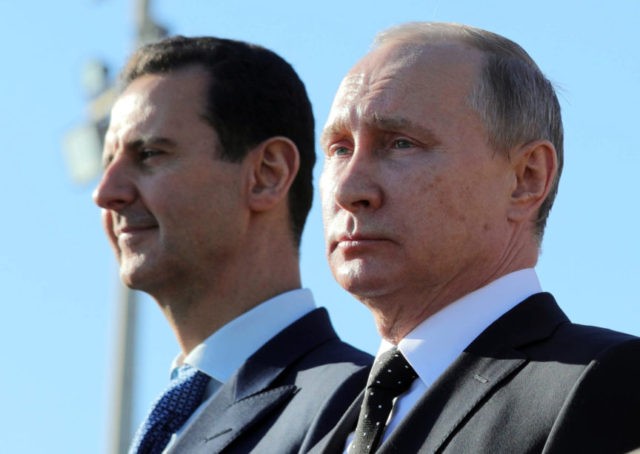
U.S.-allied Syrian Kurds, in the wake of America’s decision this week to withdraw its military forces from Syria, are faced with the prospects of making a pact with the Iranian and Russian-backed regime of Bashar al-Assad to repel a prospective attack by Turkish forces.
Vowing to ultimately clear U.S.-allied Kurdish groups from Syria, Turkish President Recep Tayyip Erdogan on Friday said his country would postpone a military operation into territory held by Syrian Kurdish fighters in northeastern Syria, Al Jazeera reported.
“Of course, this is not an open-ended waiting period,” he warned, adding, “In the next months, we will see an operational style aimed at removing the YPG [Kurdish People’s Protection Units militia] and Daesh (Islamic State) elements on the ground in Syria.”
Despite the delay, Kurdistan 24 reported that “as quickly as Thursday, Turkish-backed groups began firing on” Kurdish-held positions in Syria’s Manbij region.
Ankara and some U.S. officials consider the Marxist YPG in Syria to be an extension of the Kurdistan Worker’s Party (PKK) communist terrorist group fighting inside Turkey.
U.S. support for the YPG, the armed wing of the Syrian Democratic Union Party (PYD), has strained America’s relationship with its NATO ally Turkey.
On Thursday, after the U.S. announced the withdrawal, the U.K.-based Syrian Observatory for Human Rights (SOHR), a group that uses ground sources to monitor the conflict, reported that the leadership of the U.S.-backed Syrian Democratic Forces (SDF) and the Assad regime have already held discussions in northern Syria to hand over oil fields in exchange for a veto on the prospective Turkish invasion.
Fighters from the Kurdish People’s Protection Units (YPG) make up the majority and lead the SDF, an Arab-Kurdish alliance that has been fighting the Islamic State (ISIS/ISIL).
“They are discussing the future of the area under the US decision to withdraw from it; and the Turkish threat of a military operation in the area, the reliable sources confirmed to the Syrian Observatory that discussions are underway about handing over oilfields controlled by the Syria Democratic Forces east of Euphrates River to the Syrian regime,” the monitor group reported, referring to the SDF-Assad meeting.
Ilham Ahmed, a senior official with the Syrian Democratic Council (SDC), the political wing of the SDF, told Al-Monitor that as the Syrian Kurds weigh a renewed relationship with the Assad regime, all “arrows point to Moscow.” The Syrian Kurds and Assad regime have avoided clashes for the most part during the Syrian conflict.
Refusing to explicitly confirm the Assad-SDF meeting, Bassam Ishak, the SDC representative in Washington, told Kurdistan 24, “We always wanted a political solution through Syrian dialogue that doesn’t exclude any Syrian group or party.”
The alleged meeting between the SDF and the Syrian regime came as a delegation from the communist PKK terrorist group flew to Damascus for discussions over the withdrawal of American forces and the Turkish offensive into Kurdish-held territory in northern Syria, Bas News reported, citing an anonymous source.
Bas News learned from the source that “there is a possibility of cooperation between the Democratic Union Party (PYD) and the Syrian regime to protect the Kurdish territories of northern Syria against Turkish offensives as Damascus does not have enough troops to spread in the region.”
Syrian Kurds have declared autonomy in northern Syria, something that Assad has indicated he may be open to as long as the Kurds remain part of Syria.
The Syrian Kurds have turned to Assad in the past to counter attacks from pro-Syrian opposition Turkey, particularly in Afrin.
Pentagon officials had warned Turkey against attacking the Syrian Kurds, but the withdrawal announcement has abruptly changed perceptions of what all sides can reasonably expect going forward, prompting some Kurds to accuse the United States of abandoning them.
The United States considers the Syrian Kurds to be the most effective partner on the ground against the Islamic State (ISIS/ISIL).
YPG fighters managed to maintain control of large swathes of territory in northeastern Syria with the help weapons, air support, and around 2,000 special forces troops on the ground provided by the United States.
Syrian Kurds have warned against the U.S. decision to withdraw from Syria, arguing that such move amounts to a “betrayal” that leaves them vulnerable to attacks by Turkey and would lead to an ISIS revival.
For months, U.S. troops have served as a buffer between Turkey and the Kurds in Syria, helping to reduce tensions between the two sides.
Russia, Turkey, Iran, and the Assad regime have welcomed the prospective U.S. military withdrawal from Syria. Tensions between the United States and Turkey over Washington’s support for the Syrian Kurds have pushed the Turks closer to Russia. Turkey has indicated it is open to working with Assad.
The Assad regime controls more territory in Syria than any other warring party, including the U.S.-allied Syrian Kurds and Turkey-backed rebels.



When I alone spoke here on this it did not have to be Iran. I explained that. Now the Kurds get together with Russia and Syria. That was my position from the beginning but I included Israel and America. I am vindicated totally against losers Ross, Yamit and this other Texas woman… what a lot!
@ Michael S:
…Not!
The Kurdish YPG have been allied with the Russians and Assad against the Turks since the beginning of this conflict. This is nothing new. As President Trump correctly pointed out, our continued presence in the country would effectively mean US troops risking their lives to fight for the Russians and Assad.